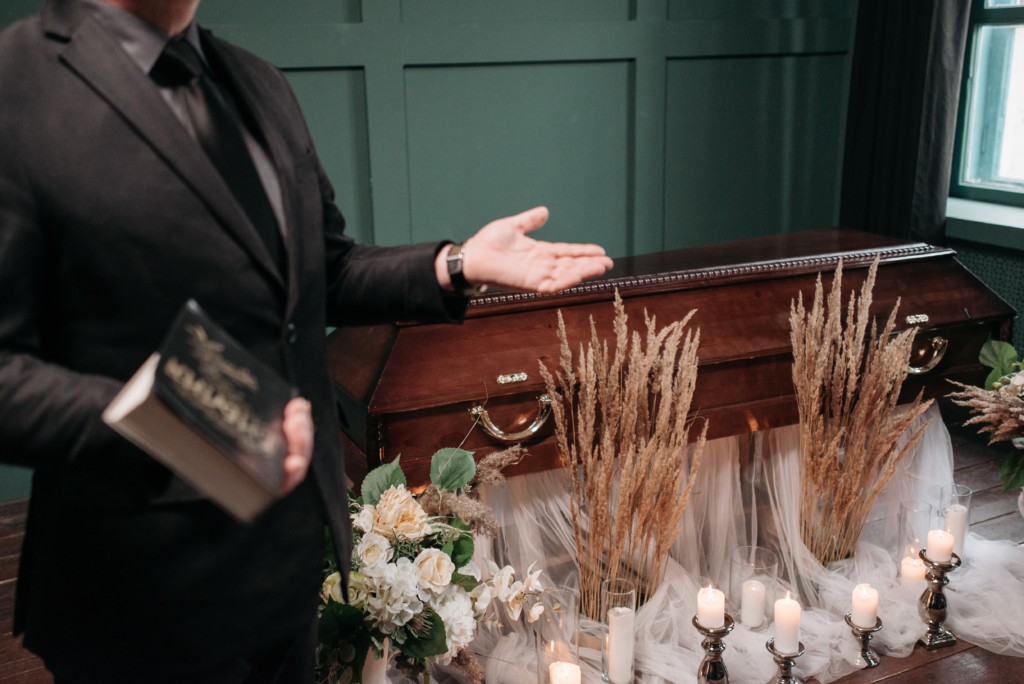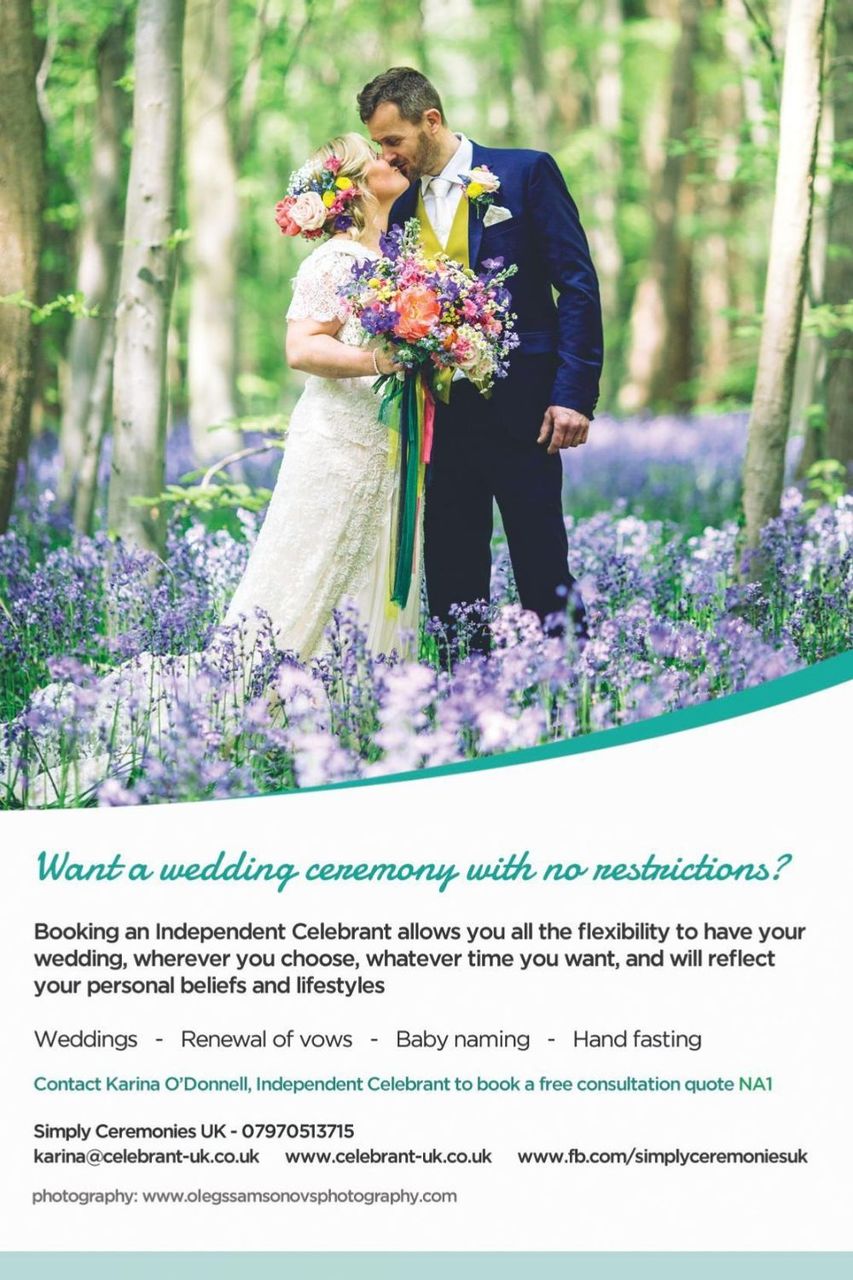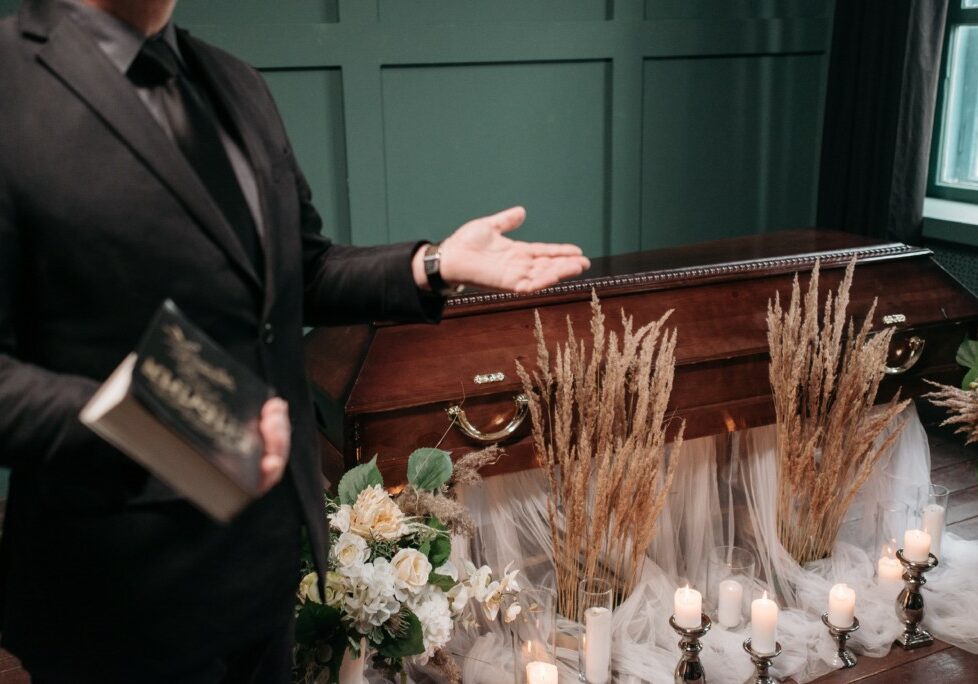
Are you giving a eulogy at a funeral for a loved one but fear you’re not up to the task? This blog answers 10 key questions to help you write and deliver a eulogy that brings your loved one’s memory to life and engages the hearts and minds of your audience.
Giving a eulogy is a wonderful gift
Giving a eulogy at a funeral of someone special to you is a wonderful gift to everyone who is attending the funeral service. A eulogy brings the person’s memory to life and helps create the legacy they will be remembered by. Being the voice of their story and legacy is an honourable responsibility.
However, writing and giving a eulogy at a funeral is not easy. How do you capture a lifetime in 10 minutes? What should you include in the eulogy, and how do you engage your audience? Even for professionals, speaking at the funeral of someone you hold dear is different from giving any other presentation. You are talking about someone special to you who has died, and it’s completely natural to feel concerned about how to give the eulogy without becoming too emotional.
If you are dreading the moment, you are not alone. You may have heard that public speaking, along with death, are mentioned by many as their biggest fears. So talking at a funeral, where the two come together, is a very brave act indeed!
About this guide
In this ultimate guide to writing and giving a eulogy at a funeral, we tackle 10 key questions that will help you write a eulogy your audience will love, and deliver it with confidence on the day.
- What is a eulogy?
- Who writes and gives a eulogy at a funeral?
- What should be included in giving a eulogy at a funeral?
- How to write a eulogy?
- How long should a eulogy be at a funeral?
- What should you not say in a eulogy?
- Can you write a eulogy for someone who was not a nice person?
- What to say in a eulogy when you don’t have any information?
- Giving a eulogy at a funeral without crying?
- How to write a eulogy for a parent/grandparent/sibling/friend/partner?
Q1. What is a eulogy?

A eulogy, or funeral speech, is a spoken tribute about a person at their funeral. It aims to capture their character by sharing highlights of their life, special memories and stories illustrating what they will be remembered for.
A eulogy helps build a picture of the person in all its facets and the impact they have had on different people.
Quite often, a eulogy will also reveal things about the person not everyone attending the funeral will know. We all play different roles in our lives as family members, friends, neighbours, colleagues, and more. Typically, people know us in a particular role and during a particular time in our life.
A eulogy brings the person to life and helps create the legacy they will be remembered by. Quoting Roman philosopher Cicero:
“The life of the dead is placed in the memory of the living”.
A eulogy is an important step in continuing the relationship with the person beyond death. It can provide great comfort to the bereaved and help them on their journey through grief.
A eulogy is a gift to the living.
Q2. Who writes and gives a eulogy at a funeral?
It’s an honour to be asked to write and deliver a eulogy. Anyone can do this. If close relatives find it too difficult to write or deliver the eulogy they may ask an extended family member or friend to do it. Also, families can ask their celebrant to deliver the eulogy.
Q3. What should be included in giving a eulogy at a funeral?
A eulogy typically includes key facts and milestones of someone’s life, but a person really comes to life when you include anecdotes and stories that encapsulate who they were. Someone won’t be remembered for the study grades they achieved – they will be remembered for how they made a positive difference to the people around them and how they made them feel. This is often found in the simple things: the gems that make someone unique.
Example questions
A few example questions that will help you find these gems:
- What three words describe her best?
- If she would walk into this room right now, what would she say or do?
- What made them laugh?
- What will you miss most?
- What is the funniest memory you have of them?
- What was he proudest of in his life?
- When was she at her happiest?
- What do you think he would want to say to all who are present at his funeral?
Q4. How to write a eulogy?

It can be a daunting task when you sit down to write a eulogy, and you realise that you don’t even know where to begin. Even thinking about giving a eulogy at a funeral, for some people, can be a scary thought. Sometimes it helps to review what other eulogy writers say about their loved ones to have living examples to draw from. Also, consider this process:
Where to start when writing a eulogy?
Start by gathering information about the person by:
- Talk to people who know them
- Pay a visit to their house (details in the interior often reveal interests and hobbies)
- Look at photographs and ask relatives about stories behind the pictures
- Read tributes on social media
- Do research about their life: googling their name sometimes leads to interesting insights especially if they maintained a website, were active on social media or were public figures
- Write down your own memories.
How to structure a eulogy?
There are different formats you can use to write your eulogy. Here are three common approaches:
- Chronological order: this will help structure the life story. The key dates can be used to frame your story and specific anecdotes and stories associated with these dates will bring the story to life.
- Key words: find 3-5 words that capture the person’s essence and tell stories to bring these qualities to life.
- Around stories from different angles: bring the person to life by sharing stories from different perspectives: close family, extended family members, friends, neighbours, colleagues.
Remember: it’s impossible to capture all details of someone’s life. Rather than aiming to be complete, find the essence of who someone was and why they will be remembered. When reading through the information you have collated, usually a common theme, symbol, sentiment, or particular story that captures the person’s spirit can be found. This helps build your story and help people remember the eulogy.
A eulogy will often trigger stories and memories of those who are listening. A moment of reflection following the eulogy gives an opportunity for people to be present with their own memories, thoughts, and feelings.
Q5. How long should a eulogy be at a funeral?
Typically a eulogy is 7-10 minutes long. This is based on people’s average attention span. However, a eulogy can be shorter or longer, depending on how much you’d like to cover.
Time slots at crematoria and burial sites vary so it’s important to know how much time you have. Your celebrant will be able to advise you.
Top tip: people tend to underestimate the time it takes to read out a eulogy at a funeral. Practicing your speech in front of the mirror is different than delivering your words on the emotional day of the funeral to an audience of bereaved people. It’s important to allocate extra time for walking up to the lectern, take a few breaths, sip some water, or if needed, take a short pause.
Word count is a more reliable tool than estimating time. As a rule of thumb, it takes 5 minutes to read out 600 words.
Q6. What should you not say in a eulogy?
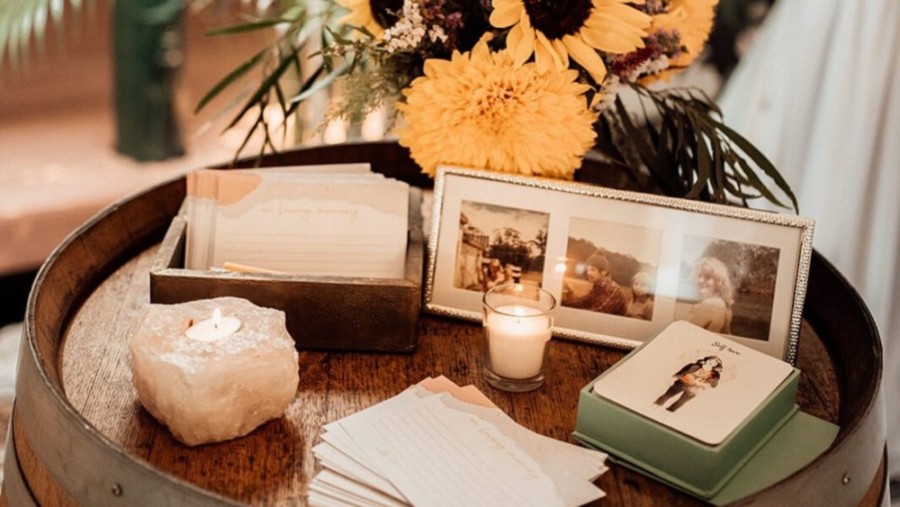
A eulogy is about the person but aimed at the people who are listening. It is therefore important to keep your audience in mind when writing your eulogy. Remember that we play different roles in our lives, and the people we connect with during our lives will have their own version of who we are.
Everyone will have their own perspective on the life and character of the person who has died. Someone may have been a difficult parent, but they may have been a good friend. Provide a balanced picture.
Dos and don’ts
- Don’t use the eulogy to vent your own frustrations or anger with the person who has died. It’s ok
- Do acknowledge that you had a complex relationship with them, or, in more generic terms, that they weren’t the easiest person to live with, while avoiding resentment.
- Don’t talk about yourself. It’s ok to tell a personal story and include yourself to bring it to life, but make sure it focuses on the person who has died and not on you.
- Don’t put words into the person’s mouth they wouldn’t have said or believed.
- Don’t quote other people without checking they are ok with their words being used in the eulogy.
Q7. Can you write a eulogy for someone who was not a nice person?
This might sound awkward or insensitive, but not everyone who has died is ‘loved’. Writing a eulogy about someone who was not a nice person may trigger sensitivities and difficult emotions. People may have had a troubled relationship with the person who has died. When gathering information for the eulogy also aim to understand who will be attending the funeral and identify any potential sensitivities.
It’s important to find a gentle and balanced way to picture a person when there are complex dynamics to consider. If you are unsure you’ve found the right tone, you can ask others to review your eulogy draft.
Although it’s ok to acknowledge that someone was a complex person, avoid using the eulogy to express anger or frustration. Instead, try to understand the underlying reasons that challenged their personality. Someone once said to me: “When someone is rude, they are either unhappy or unwell.” Identifying events in someone’s life that may have triggered their behaviour helps put this into perspective.
Acknowledge that everyone in the room has their own unique relationship with the person and their own way of mourning and remembering others. You can, for example, do this by saying:
“Like all human beings, Frank has many aspects to his life and personality. In the following, I’ll share an overview of his life communicated to me by his family and some close friends. This is by no means a complete picture, and you will all have your own unique way of remembering him. Following the eulogy, we will have a quiet moment where you can reflect on your own memories of Frank and/or be present with your personal thoughts and feelings at this time.”
Q8. How to write a eulogy if you don’t have any information?
Sometimes there’s not much information available about the deceased. They may have led a solitary life, and there are no family or friends to share information about them. Here are some suggestions to honour their life:
- Check the meaning of the name they were known by. Sometimes this gives inspiration for words of comfort. For example, if someone’s name is Grace you could refer to the hope and belief that they are now at peace, held in graceful love.
- Research their year of birth and what the world may have looked like when they grew up. What happened that year (or even: the day they were born)? What did the place they grew up in look like back then? What music will they have listened to?
- If you have access to where they lived, check out their surroundings. What will they have seen when they looked out the window? What objects did they have in the house? Any music?
Q9. Giving a eulogy at a funeral without crying?

Preparation is key to tempering your emotive reactions, not the emotions themselves. When you are grieving you may feel overwhelmed. Many things, including your emotions and how your body reacts, may feel like they happen beyond your control.
A funeral is by its nature a sombre and emotional event. The day of the funeral is for many a very difficult day. Meeting other bereaved people, seeing the coffin, and being in the solemn environment of a crematorium or burial site will affect you. It is good to acknowledge that you can’t fully control your feelings and thoughts on the day and that this may affect how you deliver the eulogy. Some things you can’t control. That’s ok.
Things you can control
However, there are things you can control. Good preparation will help you identify these and give you practical tools to feel more confident on the day.
Preparation
What can you do to prepare?
- Print your eulogy in a large and clear font with sufficient line spacing. Ensure white space between paragraphs.
- Practice. Read the eulogy out loud, preferable to someone else. Identify words or phrases that you find challenging to pronounce or do not flow well naturally. Replace complicated words with simpler synonyms and break up sentences if that helps.
- If you have the opportunity to visit the space where the funeral service takes place, do a run-through onsite prior to the day and familiarise yourself with the acoustics, the microphone, and the lectern.
- If you are worried about giving the eulogy, identify what it is that worries you. Being aware of your concerns and naming them may help to reduce your worries.
- Ask someone else to back you up on the day. This can be a family member, friend, or your celebrant. Knowing that someone else can support you or take over if you feel too overwhelmed will give you peace of mind.
On the day
- Check how you feel. Taking a few deep breaths may help you relax.
- It may help to connect with the person who has died. You are giving the eulogy as a tribute to them. You can light a candle, wear something that reminds you of them, or ask yourself what advice they would give to you at that very moment.
- Wear clothes you feel comfortable in. Avoid tight belts so your breath can flow freely.
- Bring a bottle of water. You can take a sip if your mouth gets dry, or it helps you to take a moment should you need a little break.
- Bring tissues. It’s ok to be emotional when you speak and to take a moment to wipe your tears
- Don’t forget the print-out of the eulogy!
- When arriving at the funeral, your celebrant may approach you to ask how you feel, if you’d like to do a quick run-through, and test the microphone.
While giving a eulogy at a funeral
- Before you go on stage, take a deep breath.
- When taking your position at the lectern, take a moment before you start talking. Stand firmly on both your feet. Feel how they are grounding you. Take a sip of your water, take another breath if needed.
- When speaking, stand up straight and try to look up from your script. If you are not comfortable looking at the audience, you can choose to focus on a trusted person who can give you encouraging nods and smiles while you speak. You can also focus on a fixed point on the opposite wall if you prefer to avoid human contact.
- Be kind to yourself. If you are becoming emotional, that’s ok. Take a moment to compose yourself before moving on. Remember that you have your trusted person who can take over if needed.
Q10. How to write a eulogy for a parent/grandparent/sibling/friend/partner?
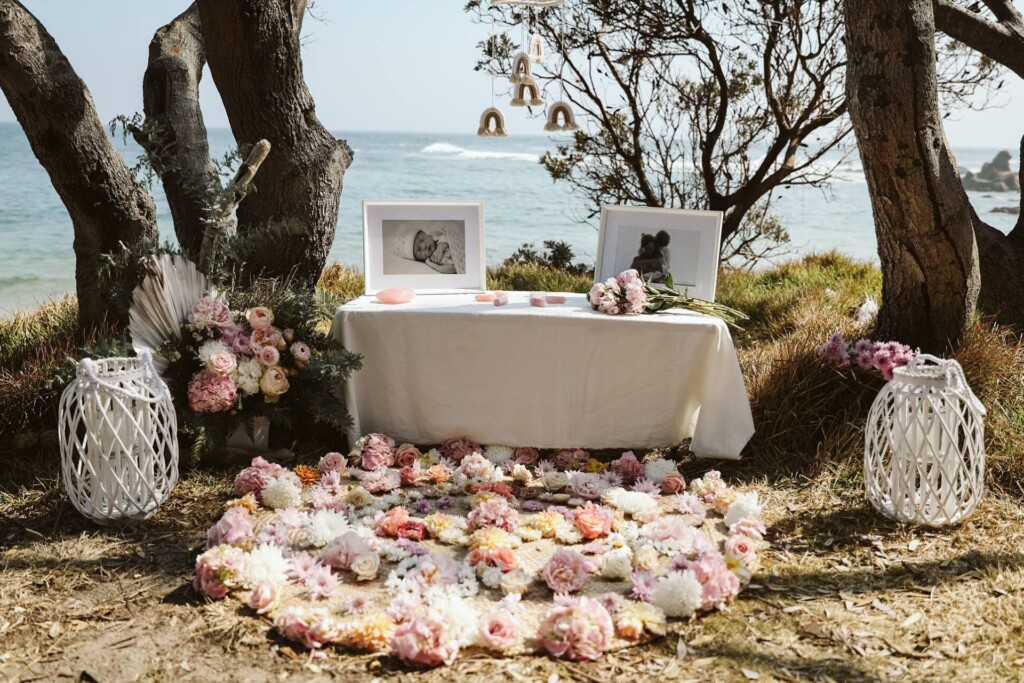
Writing a eulogy for any family member can be difficult because we often think of funerals as a way to say goodbye, but this doesn’t have to be their purpose. Instead, memorial services can be thought of as a celebration of a loved one’s life, and the beginning of their new relationship and journey with you.
How to write a eulogy for a mum or dad?
The relationship between a child and their parent is unique. A mother is always present when a child takes their first breath, and, to some children, it is a special thought that they were present when their mum took her last.
Parents shape who we become. They pass on values and traditions. We may follow them or break with them. Whatever your relationship with your parent is, they will have had a profound impact on our lives.
Some questions you may wish to include in a eulogy for a mother or father:
- What are the values they passed on to you?
- What did they teach you about life?
- Any values you are passing on to your own children?
- What will they be remembered for?
How to write a eulogy for a grandfather of grandmother?
Just like parents, grandparents pass on family values and traditions. They generally don’t have the responsibility to raise their grandchildren and tend to spoil them more than the parents. Sharing some special anecdotes is a lovely way to bring them to life. You could, for example, reflect on the following questions when writing your eulogy:
- What is your fondest memory of you grandmother?
- What jokes did your grandfather love to crack?
- What did they teach you about life?
- How have they inspired you to live your life?
How to write a eulogy for a sister or brother?
The unique thing about having a sibling is that you, generally, grow up together. An older sibling may have been an example to you or someone you looked up to. You may have gone different ways when you left home, but there will be a shared past which provides a wonderful source of memories.
Some suggestions to include in the eulogy for your brother or sister are:
- What type of child were they?
- What is the cheekiest thing you did together when you were young?
- What did they teach you about sisterhood / brotherhood / friendship?
- What was their childhood like?
Giving a eulogy at a funeral for a friend?
Unlike family, friends are connections you choose to have in your life. Some friends can feel closer than some family members, and giving a eulogy at a funeral for a friend can feel devastating to think about. If you have been life-long friends, you will have shared many happy and also sad moments together. Like any other eulogy, sharing specific stories or anecdotes is a wonderful way to bring your friend to life. Some things you could include:
- How did you first meet?
- What is your favourite moment with your friend?
- What story epitomises them?
- What quote or song lyrics captures your friendship?
How to write a eulogy for a partner?
Writing a eulogy for your wife, husband, or partner may be one of the hardest things you will ever do in your life. It may be the last love letter you ever write to them. You may consider writing your eulogy to address them directly as a tribute to the unique relationship you had.
Some elements you could include in a eulogy for a husband / wife / partner:
- How did you first meet?
- What was your first impression of them?
- How have they changed your view on life and love?
- What are your most proud of in them?
- How have they changed and inspired you?
- Would you like to give them a special promise you will fulfil during your lifetime? Perhaps a personal pledge you made to each other?
Giving a eulogy for a loved one is an act of love/respect

Most importantly, don’t overthink it or overly worry yourself . If you have agreed to this honourable task, you will do a wonderful job. Rather than trying to be perfect, write and deliver your message from your heart – anything that comes out of this place of love will be just right.
Have these questions and answers inspired you in writing and giving your eulogy? If you have any questions left, don’t hesitate to contact us or ask your celebrant.
As the incredible Dr. Maya Angelou once said:
“People will forget what you said, people will forget what you did. But people will never forget how you made them feel”.
Be proud of yourself!
After the funeral, give yourself a well-deserved pat on the back. Relax and breathe. You have done a wonderful and important job by honouring the person who has died and bringing them to life through your memorial to them. You have made them immortal!
If there is a reception after the funeral, make sure you get yourself a favourite drink to toast to your loved one’s life and their memories. They will now forever live on in the minds, hearts, and actions of those who knew them. Well done!
If you have any questions, need more information, or want some guidance, please get in contact with us now. The Celebrant Directory and all our amazing celebrants are here to help make this difficult time a beautiful and cherished memorial.
By Rosalie Kuyvenhoven, Celebrant www.ritualstoday.co.uk @rituals_today
Photography credits: Bec Zacher Photography, Roshini McCartin Photograpy,
subscribe
drop us your email and we'll send you beautiful ideas to inspire your perfect celebration




